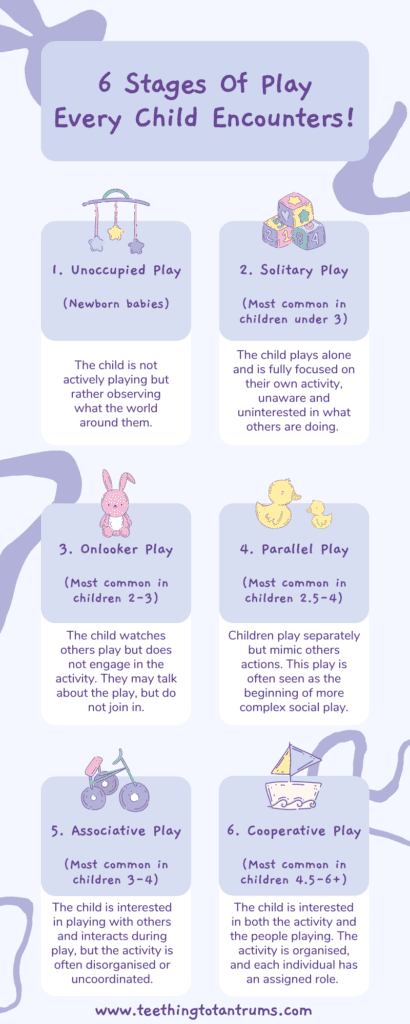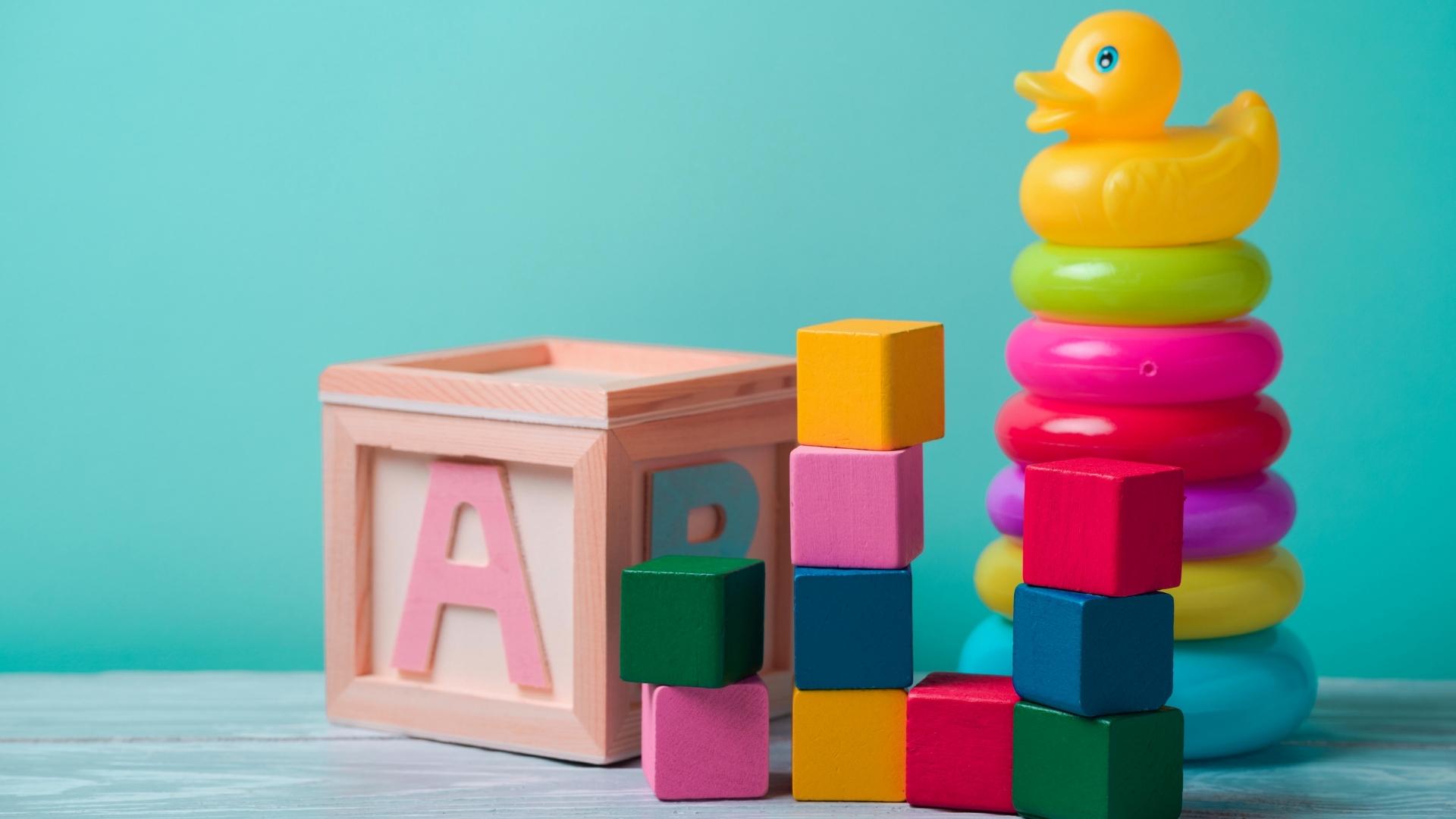Albert Einstein once said… “Play is the highest form of research.”
Because the truth is… Play is the key to unlocking our world.
And through the 6 stages of play, your child will learn vital social, emotional, cognitive and physical skills that will carry them through the rest of their lives.
What Are The 6 Stages Of Play?
Mildred Parten Newhall was an American Sociologist and Researcher at the University of Minnesota’s Institute of Child Development who studied children between the ages of 2 to 5 years, during one-minute play sessions, to analyse their social participation.
From these observations, she developed her theory of the Six Stages of Play to comprehend how a healthy child’s play developed.
These 6 stages of play are:

1. Unoccupied Play
In the very early weeks, your newborn baby’s unoccupied play is all about learning how their body works and bonding with their primary caregivers.
And in this first of the 6 stages of play, your baby will make a lot of arms, hand, feet and leg movements as they learn how their bodies work and explore what they are capable of doing.
Unoccupied play usually occurs between the ages of birth to 3 months old.
2. Solitary Play
Following on from unoccupied play, the 2nd of the 6 stages of play occurs between birth and 2 years of age.
This phase is known as solitary play.
In this stage, children will play alone and will not be interested or motivated to play with others.
Solitary play is very important for developing healthy minds as it teaches your child to play independently, explore the world through their senses, develop their motor skills and gain a greater awareness of what their bodies are capable of.
3. Onlooker Play
From about 2 years of age onwards, children will start to observe what other children are doing, but will not yet attempt to play with them.
This is known as onlooker play.
And during the 3rd of these 6 stages of play, your child may pause what they are doing to briefly watch another child play… But they will quickly return to their own activity and continue to play independently.
NOTE: During onlooker play, children may ask questions from the sidelines or offer an opinion or observation about another’s play, but they will not attempt to actively take part in an activity with others.
4. Parallel Play
The 4th of the 6 stages of play is parallel play.
This type of play usually starts to occur from 2 ½ years upwards.
And as the name suggests, parallel play is when two or more children play alongside one another, often engaging in the same type of play…
But NOT playing together.
REMEMBER: Children going through parallel play will now start to see themselves as part of a social group, but they will still be very self-centred. However, this is the perfect time to start to teach your little one about the intricate concept of sharing and taking turns.
5. Associative Play
The fifth stage of play is associative play.
Associative play occurs between the ages of 3 and 4 years.
Children who are engaged in associative play will begin to develop an interest in other children and what they are doing and playing with…
But they are not yet able to negotiate successfully with their playmates.
Although interactions will be limited during associative play, young children will start to play together by mimicking what each other is doing and by engaging in the same activity.
6. Cooperative Play
And finally, the last of the 6 stages of play is cooperative play.
Usually occurring from 4 years onwards, cooperative play is when your little one will show an active interest in what others are doing as they start to participate in play as a group.
And through healthy cooperative play, your child will start to be able to:
- Function as part of a team,
- Become better at sharing and communicating,
- Begin to practise problem-solving,
- And have a common goal when playing with others!
However, with all this said…
Your children will still need your patience and support to get them started and it is very important that you model good social skills to show them appropriate ways to communicate and cooperate with other children!
A bedtime & nap cheat sheet so good your little one will ask you to put them to bed...
Laura Williams "This is a life saver! I'm so glad I downloaded your bedtime & nap cheat sheet. My little one actually asked me to put him to bed last night! Unbelievable! Thank you so much!"
Click Here For The FREE Cheat Sheet
Other Types Of Play To Be Aware Of
Within the stages of play, there are some other types of play to consider where your child can learn some very important life skills (particularly through cooperative play):
1. Competitive Play
Playing a board game or taking part in a team activity is a great way to learn about competitive play as it teaches your child how to work as part of a team, take turns, follow rules, deal with the realities of winning and losing, and regulate the emotions that come with it.
2. Constructive Play
Playing with building blocks, Lego and other construction toys teach your child to problem solve, try again when a construction fails, and develop cognitive and fine motor skills.
3. Fantasy/ Imaginative Play
Fantasy and imaginative play are hugely important for preschoolers.
It is a type of free play that enables your child to let their imagination run wild on their own or to learn how to create a fantasy world by cooperating with their peers.
Fantasy and imaginative play are incredible at improving language and social skills as well as self-confidence. Invest in a set of dress-up clothes to get your little one’s imagination going.
Provide the perfect opportunity for your child to imagine, explore and play through the art of role-play with 3 amazing gender-neutral costumes!
4. Physical Play
Getting your children up and moving everyday is essential to their healthy physical and emotional well-being.
So spend time outside every day doing fun activities and encourage your children to nurture a love for being in the fresh air and being active.
As your children grow, encourage them to take part in sports activities, nature rambles and cycling. And offer them plenty of opportunities to kick a ball, run, jump and climb!
5. Creative Play
Creative play is where your child can explore their creativity through music, art and crafts.
By playing an instrument, singing, and working with playdough, clay, crayons and paint, you can help your child explore their creative potential and express their feelings through art.
Stages Of Play Examples And Activities
Need some ideas, examples and games to help your child through certain stages of play? Here’s all you need to know…
Unoccupied Play Examples (0-3 Months)
- Help baby to move their body by giving them plenty of opportunities to kick and move about.
- Practise tummy time daily. If your baby is struggling with tummy time, read this.
- Play with soft rattles to stimulate your baby’s senses. Particularly their hearing, sight and touch.
- Sing lullabies and gently rock your baby to help bond with your baby whilst also boosting their senses.
Lightweight and easy to hold, these gentle rattles provide the perfect amount of sensory stimulation for tiny babies to play with. Durable, soft and washable, these rattles will definitely stand the test of time!
Solitary Play Examples (3-24 Months)
- Invest in a play gym for your baby to lie under so they can learn to reach and grab.
- Utilise tummy time mats to keep your baby engaged during tummy time sessions.
- Cuddle up in a comfy chair and read books together to sow the seed of a lifetime and develop an appreciation for books.
- Encourage your baby to engage in imaginative play by offering a model train set or cuddly toys.
- Introduce simple wooden building blocks and stacking sets to promote gross and fine motor skills and learn about cause and effect.
- From 12 months onwards, invest in some age-appropriate art supplies to keep your little one entertained for hours whilst refining their imagination and fine motor skills!
This play gym is designed by experts for baby's developing brain and body. Winner of multiple awards it includes everything you need in an activity gym-from batting to teething to learning to focus-for a whole year of play.
Onlooker Play Examples (2+ Years)
- Encourage your child to engage in age-appropriate household chores. From watching you cook, clean the house or fold laundry etc your child will be very happy copying what you are doing. Encourage them to join in, ask questions about what you are doing or just let them watch.
- Go to the park! Park trips are great for parallel play as children are able to watch others play without the pressure of taking part.
- Attend playdates and toddler groups to help teach your child how to interact with other children and adults.
- Invest in open-ended toys such as wooden building blocks, an easel or realistic animal toys to develop problem-solving and imaginative thinking for hours on end.
Parallel Play Examples (2½+ Years)
- Break out the musical instruments. Singing and dancing with you at home will help your child to boost their confidence to engage with parallel play in the future!
- Be on hand to offer help and support. Prompt your child to take notice of what others are doing or help them wait their turn or negotiate sharing with another child.
- Offer plenty of opportunities to play with other children. Whether that’s through toddler playgroups or meeting up with friends, the more you can expose your child to play situations with others, the better.
All children should have a set of musical instruments to experiment with. As you know I am a huge fan of wooden toys and so this set ticks all the right boxes for me. It will have longevity and is safe for little ones to chew should they feel the need.
TOP TIP: Not wanting to join in with others is quite normal when learning how to play… So don’t try and force your little one to take part if they don’t want to. Equally, don’t force your child to give up a toy they are playing with unless they are ready to… It will only end in tears.
Associative Play Examples (3-4 Years)
- Encourage roleplay. Sharing a play kitchen or dressing up with other children is great for encouraging associative play and will continue to provide hours of fun for your children.
- Have a craft afternoon. Whether it’s painting, drawing or colouring, craft activities are wonderful ways to encourage children to play associatively.
- Play together as a family. You can help your toddler develop their social play skills by playing a simple board game, doing a craft activity together or cooking a meal as a family. All of these are great ways for you to help your child through associative play.
- Practise sharing games regularly to help your child understand the concept in a safe place rather than trying to figure it out by battling with their peers!
- Lead by example and show your child how to interact with others by sharing, cooperating and being at ease in the company of others.
Engage with your child through simple and playful Monkey-ing Around fun to boost their gross motor skills, hand-eye coordination, imitation, vocabulary and social-emotional skills!
Cooperative Play Examples (3-4 Years)
- Teach cooperation and take turns by completing puzzles, playing simple board games or even blowing bubbles.
- Model empathy and kindness in your everyday life so that your child learns how to behave towards others who are upset and need some TLC.
- Include your children in household tasks to help them develop many aspects of collaborative and associative play skills, such as cooperation, teamwork and communication. Doing laundry, cooking and cleaning are great ways to start.
- Praise kind acts. Words of encouragement and praise will go a long way to helping your child succeed socially. It will boost their confidence in their abilities and they will learn to praise and encourage others too!
These classic 24-piece wooden puzzles are easy to grasp, lift and fit together to create bright scenes of the ocean, being on safari and walking among dinosaurs! Perfect for a quiet afternoon toddler activity, these puzzles will be a wonderful addition to any toy box.
Why Is Play Important In Early Childhood Education?
The importance of play in early childhood development and health cannot be emphasised enough.
Playing allows children to use their creativity while developing their imagination, dexterity, and physical, cognitive, and emotional strength.
And whilst play is vital to healthy brain development…
Playing is also how children explore, investigate and interpret the world around them and begin to understand human emotions and relationships.
Play helps develop a child’s social & communication skills, cognitive development and powers of reasoning.
In addition to all this, a child’s sense of self-worth and faith in his or her own abilities are greatly influenced by play and how we interact with them.
Offering Opportunities To Play And Learn
As young children are learning all the time through play, it is important that as parents and carers, we provide them with plenty of opportunities to play.
To enable our children to flourish in all developmental areas it is important that they have the following opportunities to…
- listen to different sounds such as animals and birds, sing songs and rhymes, listen to stories, music and play musical instruments.
- look at interesting objects such as mirrors, shells, stones and leaves, boxes and tubes and plants and animals
- touch a variety of textures that are soft, hard, bumpy, prickly, smooth, rough, cold or warm
- taste a range of flavours such as fruit, vegetable, milk, bread, sweet and sour.
- investigate objects that react such as opening and closing, floating, sinking or twisting and spinning.
- experiment with sand, water, dough, paint, pens and crayons.
- explore large objects that make a noise and can be pushed or pulled such as boxes, tunnels and ride-on toys.
- have adults and other children participate in their play, when appropriate. As well as watch, praise, and encourage them.
- talk and question whatever they are learning about through play and everyday activities.
But…
As parents, we must make sure our children are having fun when they play and never feel pressurised.
So never push a child to play or participate in a certain activity if they do not want to.
Children develop in their own time and at their own pace, so be patient and try not to compare your child to their peers.
REMEMBER: “We don’t stop playing because we grow old; we grow old because we stop playing.” – George Bernard Shaw.
Need More Parenting Help?
- Download our FREE Bedtime & Nap Sleep Cheat Sheet. It’s a free, easy-to-use and proven formula designed for parents of 0-5 year olds to master the art of consistently undisturbed and restful sleep without the yelling, nagging or exhausting long-winded evenings.
- Check out our Parenting Toolbox. You’ll get access to expertly-chosen products that you can guarantee are the best for your little one and your wallet.
- Are you looking for personalized guidance to navigate the challenges of parenting? I offer 1-on-1 consultations to bring you tailored strategies and actionable advice to help support your child's growth and well-being with confidence.

A bedtime & nap cheat sheet so good your little one will ask you to put them to bed...
Laura Williams "This is a life saver! I'm so glad I downloaded your bedtime & nap cheat sheet. My little one actually asked me to put him to bed last night! Unbelievable! Thank you so much!"
Click Here For The FREE Cheat Sheet


![12 Natural Beeswax Crayons [2 Pack]](https://m.media-amazon.com/images/I/81Mb7grQkcL._AC_SX679_.jpg)







